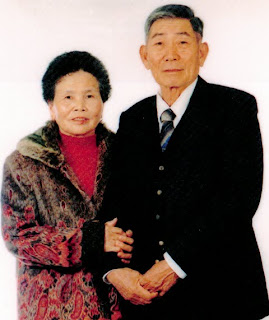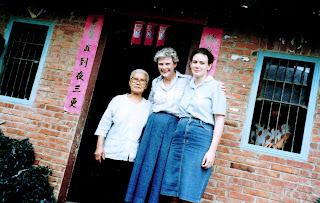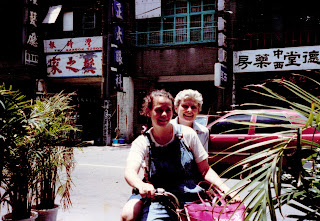
The family party celebrating my mom and uncle's visit with gifts of horse-sized prenatal vitamins.

Pa and Ma Liu

At the upper house of the Liu Family Farm with Liu Yuni's Great-aunt (last living relative of his grandfather's generation)

At the upper house of the Liu Family farm with Yuni's great-great aunt (last living relative of his great-grandparents' generation).

Taking my mom to visit the Gloria English School on my scooter.
After the family knew I was pregnant, Pa Liu began spending much time telling me about the Liu family history. He talked about his grandparents. Great-grandpa Liu had been an herbal veterinarian, and his wife had been a literate midwife and pediatrician. They had been widely respected in the community for their book-learning and skill at healing. Then the Japanese had taken over Taiwan towards the end of the Qing Dynasty as part of the "Unequal Treaties" that gave foreign powers treaty ports and concessions in China. Many Hakka, with their strong sense of tradition and connections to Chinese heritage and culture, opposed Taiwan’s annexation to Japan. They waged guerilla warfare from bases in the hills against the Japanese occupying forces.
The Liu family farm was nestled up in the hills in the north-central part of the island. Great-grandpa and great-grandma Liu sheltered guerillas and used their medical skills in support of the anti-Japanese cause. The result was that the family had been blacklisted. None of their children and grandchildren was allowed an education. Pa was the youngest boy of his generation, and I think he was even the youngest child among all his cousins. He was his grandmother’s special charge until she died when he was around ten. Great-grandmother saw to it that towards the end of the Japanese occupation, when things were a little looser and Grandpa Liu had made friends with the Japanese by paying regular and frequent bribes, Pa Liu was allowed to go to school. He went to three years of Japanese school, and then the war was over and the Chinese retook Taiwan. So Pa Liu went to fourth through sixth grade in Chinese, and had to learn to read all over again.
As she got older Great-grandmother Liu kept telling Pa that the Liu family had been a great family. They were not just peasants. They had been literate, gentlemen farmers. Since he was the only one of his generation to go to school, he needed to find a way to restore the family honor. He made a death-bed promise to his grandmother that he would find a way for his children and grandchildren to get an education.
All his children went to school through junior high, which was as far as they could go without an exam in those days. Four of his children went to high school, three of them graduating from it. And Yuni went to college, even though the family had to sacrifice a lot to keep him there. Now that Pa Liu had a college-educated daughter-in-law, he spent much time discussing the future of his unborn grandchildren. His grandchildren needed to be literate. They needed to speak Hakka, Mandarin, and English. They needed to go to college. I agreed with him on all those counts.
Then we had the problem of the names. The "came-to-Taiwan" ancestor had brought a poem or a list of generational names through Yuni’s generation. The second character of all the men in Yuni’s generation is Yun. (The first character is the family name: Liu). All the girls have the second character Hsiu. But the list stopped with Yun. Others in the family had tried to find out, but in the late 80s not many Taiwanese were able to get to the mainland, especially if they were not rich businessmen. I had friends in America and Hong Kong who made frequent trips into mainland China. So Pa and I went back to the old family farm to see if we could figure out a way to find the next generational character in the list. We found out that the family came from Mei County in Guangdong Province, from a place called Peng City. I found a friend who was going to visit that area of Guangdong, and they offered to help me look. But it was of no avail. Peng City had been destroyed long ago, and although there were several Liu families in the area, no one had the same generational character list. So we were stuck.
In the end, we decided to choose our own generational character for Yuni and Yuntian’s children. We chose the character "Yung" (pronounced yong), which means "eternal". Yuntian agreed that his kids would use that character when the time came. This search for the generational character took place over several months. By the time we knew that we would not be able to find it, we pretty much just needed to sit back and wait for the birth of the twins. We knew that one would be a girl, and we thought we would call her Yungai (Eternal Love). If the other twin was a girl, we would call her Yungjun (Eternal Truth), and if it was a boy we would call him Yunghsin (Eternal Faith). I chose some English names, and we went back to watching my stomach grow as we waited for the birth.




4 comments:
Teresa: Once again, I'm fascinated by the imminence of years of tradition, carrying forward into the daily lives of the people in this wonderful, expanding tribe, via history (lost and found) and names. I can't remember if I had already read that the Liu family was in Taiwan long before (yes?) the Communist takeover of the mainland, but it struck me as yet another interesting facet. I'm not sure I fully understand the custom of naming "characters," but I love the richness it conveys.
Apologies for taking so long in getting to this; the room is heavy upon us to the new casa. I'm hoping that once we are settled (the big move is this weekend), some normalcy will return to Muravia and the Muravian's travels.
Peace to you, amiga.
Hi Murat,
I was hoping that you were not sick when there was no new content on your blog. Glad to know that it's just a move in the offing. I hope your new home is a happy, inviting place.
The Lius have been in Taiwan for many, many generations. "Came-to-Taiwan Ancestor" (literal translation of what they call him) was generation 13 on the list. Yuni is generation 19 and our kids are generation 20. We are at the end of both generations, some from Generation 20 were already old parents when our children were born. I think that the ancestor came to Taiwan in the late 18th or early 19th Century.
Liu Yuni's name in Chinese is 劉運意. The first character is the family name: Liu, the second is the generational name Yun and the third is his own special name: 'I", which can also be written Yi, depending on which style of transliteration is used.
His sisters and female Liu cousins all have the character 秀 in the middle of their names.
Our children and his brother's children all have the middle character 永. One of the other families in the upper house also uses the same character for Generation 20, but we did not know that when we named them. By Generation 20 they are 4th or 5th cousins in the upper house. But to the Chinese mind they are much closer because they trace their roots to these two farm compounds nestled in the hills with a common ancestor and the same list of naming characters. And all share the same communal tomb after being cremated or after being reduced to bones in a cemetary for 5 to 7 years. The communal tomb is filled with urns of bones or ashes, no bodies.
Well, I didn't mean to get morbid, but there is a real sense of place and family and belonging.
Teresa
Fascinating indeed!
Hi Cloudia,
Glad you enjoyed it. It was very interesting for me, too.
Post a Comment